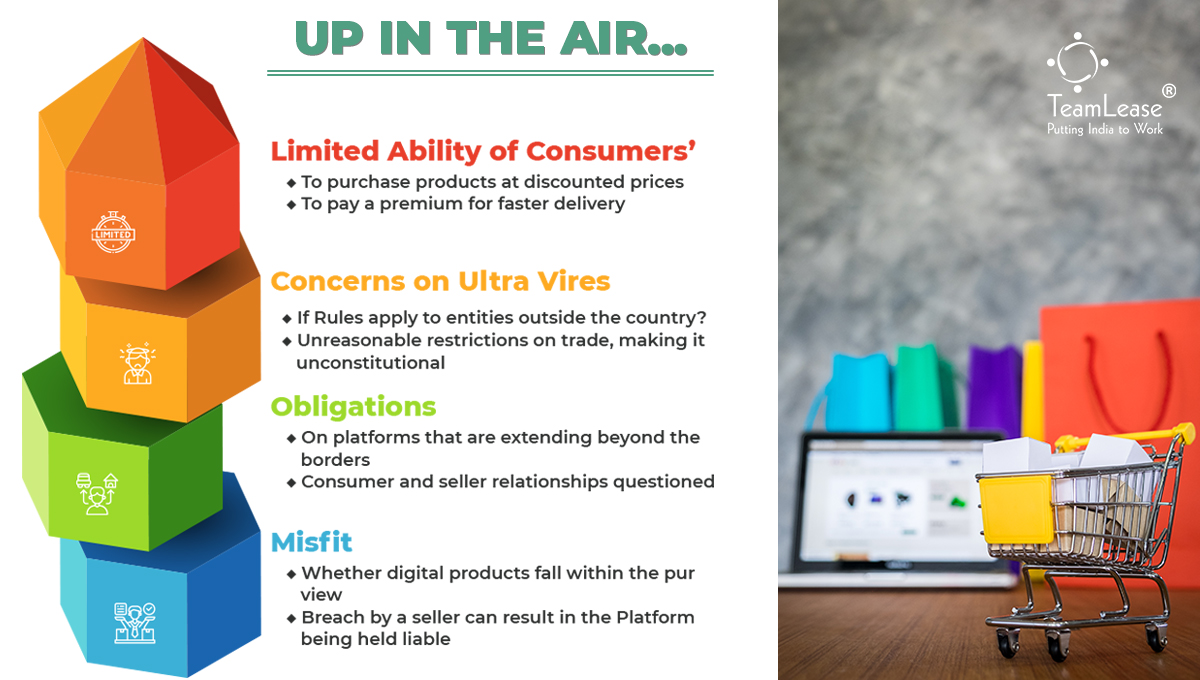13 Reasons Why: New E-commerce Rules Haunt Businesses

The new e-commerce rules had a greater and direct impact on the businesses. Those there were welcoming aspects, there have been certain aspects that cannot be ignored. Looking at the flip side of the coin, gives one a specific idea on the peculiarities of these new rules.
Concerns Still Linger
Any breach of these Rules will have to satisfy the condition of being an “unfair practice” before they are held liable. Several questions are still unanswered in these new rules, like –
1: At the functional level, is the implementation and application of the rules possible to the fullest extent?
2: Silence on the assessment licensed by an entity based in another country. (Assessment of goods assembled, packaged or manufactured in one country)
3: The kinds of digital product offerings fall within its purview?
4: If a breach by a seller can also result in the Platform being held liable?
5: If the new rules of the act are beyond the legal power or authority (ultra vires)?
6: Complicated because these rules are applied to entities outside of the country.
7: The rules’ obligations are imposed on platforms that are extending beyond the borders between consumer and seller relationships?
Up in the air…
Key Issues with New E-commerce Rules
At a deeper level:
8: Lack of Definition: Lack of uniform definition of e-commerce, since buying/selling goods online are generally considered as e-commerce/internet commerce, even though the final delivery is largely offline.
9: Ease of Doing Business: The restrictions include a gamut of compliances, which, by increasing the regulatory burden, can reduce the ease of doing business for startups on online platforms.
10: Entry Barrier: Free trade practices that enabled startups to easily enter the e-commerce trade arena would cease to exist.
11: Burden on Sellers: The burden will eventually trickle down to the sellers, affecting the top line.
12: Agreement Rejig: Any company that currently has a common beneficial ownership agreement or is associated with an e-commerce company will not be allowed to be listed as a seller on that platform and might have to shift. This could result in building a whole consumer base from scratch involving costs and/or losses
13: Increased liabilities: For online e-tailers for all trade carried out on their platforms.
Business Impact and Probable Outcome
Although these New Rules are a welcome step in ensuring the welfare and protection of the interests of consumers using the various e-commerce platforms, these new rules will also put significant limitations on the consumers’ ability to purchase products at discounted prices and pay a premium for faster delivery.
For the platforms, the dawn appears gloomy as businesses have a host of things to comply with as per the rules laid out. There are thus multiple pointers that the businesses are worried about.
On the Lookout
As mentioned, the new rules have a flip side of the coin to look out for, and these are quite haunting. Unless the concerns are answered, it is difficult to migrate everyone onto a new ecosystem without turbulence.
However, we must welcome these changes as the rules and not as the ruler. With a positive growth outlook for the E-commerce industry, it’s necessary to take stock of the drivers of growth, as they are the implicit rulers of the industry. These new rules are a stepping stone for the regulatory norms surrounding this industry to bridge the gap between brick-and-click marketplace models.
Latest Blogs
5 Key Manpower Supply Strategies for Hiring Better Talent
In today’s competitive job market, ensuring a reliable manpower supply is critical for business continuity and growth. Whether managing large-scale operations or expanding your business,...
Read MoreBoosting Employment in Rural Areas Through Staffing & Skilling
Rural India is evolving. With nearly 65% of the population residing in villages, it is clear that the next phase of India’s growth story will...
Read MoreFinancial Impact of Attrition & Role of Recruitment Partners
That’s why understanding the actual cost of attrition is more crucial than ever. We at TeamLease keep on tracking and analysing data to come up...
Read MoreStaffing Process: Definition, Key Steps, and Its Importance
Having the right talent in the right roles is crucial for business success. The staffing process plays a vital role in ensuring that organisations attract,...
Read MoreWhat are the benefits of HR outsourcing services?
As the world of work evolves at lightning speed, one thing has become clear: agility and efficiency are no longer just nice-to-haves; they're essential for...
Read More






